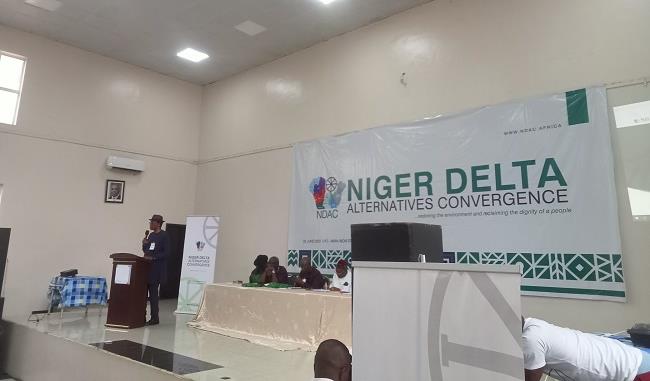The Nigerian government has been told to halt the divestments by international oil companies (IOCs) operating in the Niger Delta until full consultations have been had with affected communities and their environments are fully restored.

While stressing that the divestments are targeted at evading justice for the ruination of oil-bearing communities, participants at the Niger Delta Alternatives Convergence (NDAC) that held on Thursday, June 23, 2022, in Uyo, Akwa Ibom State, asked government to produce a framework and guide on how oil companies disengage from areas they have operated in.
The forum also demanded a comprehensive environmental audit of the Niger Delta with Ogoniland serving as the starting and learning point of the exercise, which entails remediation and restoration of all impacted sites.
Participants called for action to stop oil theft in the region, review of the Petroleum Industry Act (PIA) to address lingering issues of gas flaring, establishment of Host Community Development Funds, and halting the criminalisation of community right to civil disobedience.
They also want the forensic audit on the NDDC released and prosecution of those found to have fleeced the Commission, mapping of the environment and climate hotspots to ensure resilient intervention initiatives, make Niger Delta Sea Ports functional to reduce pressure on Western Sea Ports, and ensure speedy rehabilitation and completion of roads in the region especially the East/West Road.
Calling on political leaders to become more accountable and champions of Niger Delta issues, the forum urged Niger Delta communities to demand accountability, speak up against environmental, socio-cultural injustice and effectively participate in policy formulation.
The gathering included frontline communities, civil society, development, and government actors who discussed and analysed the most critical socio-ecological issues impacting the Niger Delta region and proffered solutions.
The engagement interrogated current realities and impacts facing the region such as natural resource governance, impacts of oil extraction on the people and environment, and the growing number of International Oil Company (IOC) attempting to divest from the region. Participants also probed state level interventions aimed at addressing the neglect of the region and how they fared.
The highpoint of the engagement was the unveiling of the Niger Delta Manifesto for Socio-Ecological Justice that aggregates the key issues affecting the Niger Delta into a single regional advocacy manifesto to drive popular advocacies and campaigns and address the issues confronting the region.
In his welcome words, Director, Health of Mother Earth Foundation (HOMEF), Nnimmo Bassey, said considering that the world is moving from fossil fuels and that Nigeria is struggling unsuccessfully to meet her OPEC production quota, the Niger Delta risks not just being left behind by the world, but also of remaining mortally wounded and utterly stranded if the people do not brace up and insist on urgent transition from destructive fossil fuel extraction activity, and insist on a clean-up of the entire region.
Chairman of the Convergence, Obong Victor Attah, former Governor of Akwa Ibom State, declared in his opening remarks: “We must be ready to ask and provide answers to such questions as: Do we need new methods of administration; do we need a complete system change? At the end, this convergence must bring about something new and beneficial to the long-suffering Niger Delta region.”
The Convergence was convened by HOMEF in collaboration with frontline civil society organisations, socio-cultural groups and individuals in the Niger Delta region.
